NJ Teachers of English to Speakers of Other Languages/
NJ Bilingual Educators
ARTICLES: SPRING 2023
Voices Journal is Online with Helpful Information for You
and
Take a Look at Where We’ve Been– Marilyn Pongracz
Practical Help for Teachers of Multilingual Learners
and
Math Word Field Notes: A Collaborative Project Across Subject Areas– Jade McDaniel
New NJDOE Web Pages for Title III, Part A Language Instruction for English Learners and Immigrant Students
and
Some NJDOE Site Contents
Transforming the Resources You Have into Accessible Formats for All Students– Carmen Nguyen
and
De-Mystifying Complex Texts: What are “Complex” Texts and How Can We Ensure ELLs and MLs Can Access Them?– Elsa Billings and Aída Walqui
The Evolution of Terms Describing English Learners: An ELL Glossary– Ileana Najarro
and
If We Must Label Language Learners: EL vs. MLL– Raichle Farrelly
The Title III/ESL/Bilingual Unit Will Be Hosting Office Hours
and
Professional Learning Opportunity
Homework for Beginning ESL Students: 8 Tips for Success– Melissa Miller
and
9 Entertaining ESL Homework Ideas to Improve Your Students’ Language Skills– Susan Verner
Engaging Elementary MLEs in Writing in the Digital Era– Nabat Erdogan & Jason Carter
and
Classroom Assessment for Academic Writing– Ling He
4 Tips for Teaching English through Science– Judie Haynes
and
All teachers need to teach language and literacy, not just English teachers.– Sue Ollerhead
Our Spring Conference
and
Some Participants’ Comments
Summer Activities for English Language Learners
and
7 Benefits of Reading Aloud to Multilingual Learners in School– Judie Haynes
NJ Cover All Kids Healthcare Program
and
NJ Family Care Coverage
Welcome NJTESOL/NJBE New Executive Board Members
and
Our Outgoing Executive Board Members Thank You
March 21, 2023
2023 Annual Voices Journal
Is Online with Helpful Information for You
 Contents:
Contents:
A Principal’s Framework for Supporting MLLs
Alex Guzman
A framework for high school principals to support MLLs. Alex Guzman, a former principal, shares a practical approach to serving MLLs and learning to address their needs.
Translanguaging An Inexperienced Teacher’s Guide to Implementation
Christine Donatello and Chiu-Yin (Cathy) Wong
A reflection of exploration following a teacher’s inexperience with the concept of translanguaging through her journey of adapting it into her classes and witnessing positive results. It provides tips for teachers to use to implement translanguaging in their own classrooms along with the reasons for doing so to create an equitable education for emergent bilingual students (EBs). A workshop will be presented by the authors at NJTESOL/NJBE Spring Conference 2023.
Curriculum-Thinking around the 2020 WIDA Standards Framework
Margaret Churchill & Hana Prashker
Using the principles of backward design, educators can plan and create units and lessons that implement the big ideas of the 2020 WIDA Standards Framework by examining released ACCESS for ELLs test items. These tasks by grade level cluster serve as design models as we consider how to put the WIDA Standards Framework into practice in our own classrooms. A table provides a focus for unit planning around the Key Language Uses that are prevalent in grade-level clusters.
How Does Sara Think?
Tina Kern
In our educational community today, students seem to be experiencing what is considered a “learning loss”. As a result, data has become more important as a measure of growth. This mindset has sent the message to students that, above all, the correct answer is valued. In this atmosphere, the concept of learning the process of achieving the answer, instead of just submitting the correct answer, has diminished. How do we step back and spend time assisting our students with strategies so that they learn the value of the process, of the “why”, instead of just submitting the answer?
Save Time! Streamline Your Unit and Lesson Planning Using the WIDA Standards Digital Explorer
Lynn Shafer Willner
Saving 10 minutes a day can add up to 30 hours a year. Are you looking for ways to save time without skimping on the quality of your unit and lesson planning? This article suggests three time-saving tips for using the WIDA Standards Digital Explorer as part of your design process including Identifying unit goals for language development, selecting Proficiency Level Descriptors and/or Language Functions and their associated Language Features for language lesson objectives, and locating standards-aligned digital resources.
Science Education for All: Integrating Science Content Attainment and Language Development for ELLs
Cecilia Vila
An overview of how to integrate academic language development and content attainment through a collaborative approach. The focus is to provide an example for educators in grades K-8 whose students are English Language Learners who may or may not share the same home language. It provides a snapshot of the interactive workshop with the same title presented by Ms. Vila Chave at the 2022 NJ Science Convention, and that will also be presented at NABE 2023 and NJTESOL/NJBE Spring Conference 2023.
Cooperative Teaching Note-Taking Model
Bryan Meadows
A professional reflection on a note-taking technique a push-in ESL teacher is using in a high school Biology classroom emphasizing content-area vocabulary using shared digital notes.
Take a Look at Where We’ve Been
By Marilyn Pongracz
 Did you know that you can visit past issues of online Voices all the way back through 2016? You can peruse the different iterations of our newsletter from the time it was first published online to the current weekly issue.
Did you know that you can visit past issues of online Voices all the way back through 2016? You can peruse the different iterations of our newsletter from the time it was first published online to the current weekly issue.
There are highlights of our Spring Conferences in the winter and spring articles as we were preparing for the event, and then in the summer, the photo galleries of the activities and the awards receptions from each year.
You can look for articles on special education by Sonya Bertini in the SIG sections. Her article, Navigating the World of Special Education, is relevant today. Discover other articles that tell stories about our precious students, including many by Tina Kern in the Features sections or in the SIGs such as this one by Angeline Sturgis.
You might also want to journey with Angeline as she crosses into a different culture in My Experience as an American Teacher Volunteering in Tamale, Ghana.
There are many more that you can find that could have been written this year, such as The Importance of Teaching Difficult History – also by Sonya Bertini, and it includes a book list for your students.
And finally see how we, as teachers, helped our students even during the trauma of the pandemic and how there is success on the other side.
Marilyn Pongracz is the NJTESOL/NJBE Technology Coordinator and the ESL Tutoring Supervisor at Bergen Community College.
March 28, 2023
Practical Help for Teachers of
Multilingual Learners
 Jody Nolf, previously a secondary ESOL teacher and an ESOL coordinator, is now a Literacy Engagement Specialist for Vista Higher Learning. Recently on social media, she shared her free website and her padlet. Both are named JNolfESOL. They both contain practical information and lesson plans for secondary teachers of Multilingual Learners (MLLs).
Jody Nolf, previously a secondary ESOL teacher and an ESOL coordinator, is now a Literacy Engagement Specialist for Vista Higher Learning. Recently on social media, she shared her free website and her padlet. Both are named JNolfESOL. They both contain practical information and lesson plans for secondary teachers of Multilingual Learners (MLLs).
Her website contains:
- Google Slides with basic math concepts for Newcomers
- Professional Development with examples using R.A.C.E.S. (Restate, Answer, Cite, Explain, Sum up) in Science with sentences frames and color coding
- Her four Saddleback webinars which contain practical and helpful information and lesson plans
- A close reading unit about Emily Francis – an ESL teacher and author from Guatemala now living in North Carolina
- In the Smartboard section, she gives examples for math and science with and without technology.
- A collaborative practical planning template with examples for math and science.
- Possible Topics for Parent Night presentations
- Her favorite links including Rewordify
Jody Nolf’s Padlet contains much of the same as her website with a few additions:
- 18 #CollabChat videos with demonstrations for ESOL teachers and content area teachers
- Teachers Resources includes a sample pamphlet to share with content-area teachers about MLLs.
- Additional PD presentations of various lengths with a video called “How It Feels to be an ELL”
- Jody Nolf’s website and padlet contain practical information, professional development for ELL and content area teachers, and lesson plans.
Contributed by Hana Prashker, NJTESOL/NJBE Liaison, and teacher in Hasbrouck Heights School District
Math Word Field Notes: A Collaborative Project Across Subject Areas
By Jade McDaniel
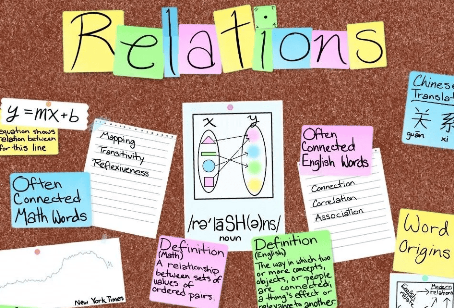 In this article, McDaniel describes a New York Times project that combines language arts and math vocabulary. The activity, which involved high school students in a Technical Reading and Writing class, can be adapted for any students, including multilingual learners.
In this article, McDaniel describes a New York Times project that combines language arts and math vocabulary. The activity, which involved high school students in a Technical Reading and Writing class, can be adapted for any students, including multilingual learners.
The first step in the lesson was looking at examples that were previously created for a New York Times contest. After that, appropriate level math vocabulary words were chosen. In the description of this lesson, students taking the language arts class worked in partnership with students in a math class.
The students in the math class researched the definition of the assigned term and provided examples of how the word is used in equations. Their partners in the language arts class looked for uses of the term in non mathematical contexts as well as synonyms, antonyms, translations in another language, and their own possible connection to the word. After the students checked their work and received feedback from each other, they created posters of the words.
McDaniel concluded by noting that this activity lends itself to any combination of subjects in the curriculum.
You can see some sample projects and more details here.
April 4, 2023
New NJDOE Web Pages for
Title III, Part A Language Instruction for English Learners and Immigrant Students
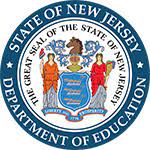 In New Jersey, we are so lucky to have a Department of Education that has an Office of Supplemental Educational Programs that supports many of our students in this state.
In New Jersey, we are so lucky to have a Department of Education that has an Office of Supplemental Educational Programs that supports many of our students in this state.
Specifically, they administer funded programs under ESEA/ESSA such as Title I part C (migrant education) and Title III (language instruction for English Language Learners and Immigrant Students). Did you know that they also oversee Title IX, Part C (McKinney-Vento Homeless Education Act)?
The value of the work that they do is evident not only in the successful programs around the state, including but not limited to the Seal of Biliteracy and Educational Stability for Children in Foster Care, but also by the popularity of their workshops at our NJTESOL/NJBE Spring Conference.
We at NJTESOL/NJBE are so grateful for their hard work and willingness to collaborate in the education of multilingual learners in the state. Recently the Department of Education has revised its website, and the Office of Supplemental Educational Programs would like to alert educators and administrators to the new information locations.  There are also more pages for parents and the opportunity to have the page translated using the Google translate tab at the top of the page.
There are also more pages for parents and the opportunity to have the page translated using the Google translate tab at the top of the page.
See below for more about the contents on the site.
Some NJDOE Site Contents
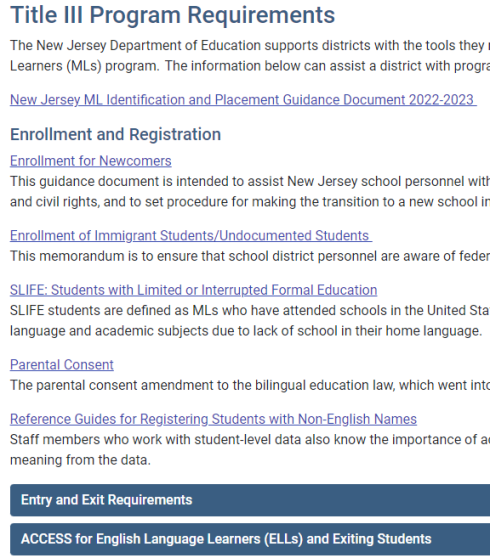 Here is the link to the new landing page for the Office of Supplemental Educational Programs Title III page.
Here is the link to the new landing page for the Office of Supplemental Educational Programs Title III page.
Under the District Requirements page are tabs for District Resources, Title III Program Requirements, and A Guide to New Jersey ML Programs. This image is the tab for Title III Program Requirements
There is also a page on Professional Learning which contains a variety of resources for teachers.
This update will also provide more information and support for administrators and educators in New Jersey.
April 11, 2023
Transforming the Resources You Have into Accessible Formats for All Students
By Carmen Nguyen
 Carmen Nguyen addresses the problem of finding “resources that are authentic and challenging and address grade-appropriate concepts, but are also at the students’ reading level.”
Carmen Nguyen addresses the problem of finding “resources that are authentic and challenging and address grade-appropriate concepts, but are also at the students’ reading level.”
She notes that texts which have been adapted with simplified vocabulary often also delete necessary complex sentence structure needed for comprehension. Even some of the websites that can change the level of the text do not provide an adequate solution. Nguyen lists five steps for adapting authentic text.
- Determine the Goal for Using the Text – What students will need to accomplish and whether they will be doing this independently, with a group, or with the teacher’s help.
- Read Text Using Different Lenses – Decide what information is necessary for students to complete the assignment, and what vocabulary needs to be taught.
- Decide Which Student/s or Group/s Will Receive the Adapted Text – Use your students’ reading proficiency levels to choose what scaffolds are needed.
- Determine Whether or Not Clarity is Needed – Here the author provides a chart to guide the adaptation of the text. For example, one item in the chart is “Does the text contain charts, tables, pictures, diagrams, photographs? Yes-Leave it alone or Enhance, No-Enhance”
- Select and Add Features to the Text to Enhance the Readability – This includes a second chart. One item is to add repetition of names or concepts.
For teachers who are just getting started in adapting text, the article concludes with this: “A last piece of advice is to not overwhelm yourself with too many supports. Begin with embedding features that will give students just enough access and move forward from there. Yes, adapting texts or resources does take time and practice. But all things worth doing take time.”
See the article with helpful links and charts.
De-Mystifying Complex Texts: What are “Complex” Texts and How Can We Ensure ELLs and MLs Can Access Them?
By Elsa Billings and Aída Walqui
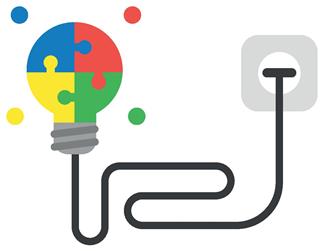 Billings and Walqui define the issue of being able to understand complex texts in different subjects as requiring “understanding the purposes, concepts, structural organization and language use unique to those disciplines.” This is especially difficult for MLs.
Billings and Walqui define the issue of being able to understand complex texts in different subjects as requiring “understanding the purposes, concepts, structural organization and language use unique to those disciplines.” This is especially difficult for MLs.
The solution that is most common is simplification. However, they demonstrate how simplification, especially by rewriting text with short sentences and eliminating the connections between them, can actually make the content more difficult to understand.
The authors provide a three-step alternate strategy called “Pedagogical Scaffolding” which will help students build the skills for comprehending written information now and in the future.
- Background Knowledge – Finding out what students already know can guide the teacher in providing information that supports the topic. He gives the example of reading “in a jigsaw format” (small groups study one aspect of a topic and share it with others in the class) to learn about life between 1500 and 1600 before reading about Shakespeare.
- Metalinguistic Awareness – Students must be taught to look for vocabulary that introduces and gives examples of the topic. For some students, cognates can also help.
- Text Engineering – They recommend dividing text into “chunks” that include headings and “focus questions.” Images and captions for vocabulary also support comprehension.
See the article for more information, examples, and details.
April 18, 2023
The Evolution of Terms Describing English Learners: An ELL Glossary
By Ileana Najarro
 Ileana Najarro provides a historical view of the terminology used for students who are learning English and how those terms have affected the services for these students.
Ileana Najarro provides a historical view of the terminology used for students who are learning English and how those terms have affected the services for these students.
The Supreme court ruling in 1974 required schools that received federal funds to provide language services for English learners so they would have equal access to education. The terms used at that time were non-English proficient (NEP) or the preferred term limited-English proficient (LEP).
Although “advocates and researchers early on noted how LEP connoted a view of students as having a deficit”, this did not change to ELL until 2002 with No Child Left Behind. EL became the official federal label with the 2015 Every Student Succeeds Act and is still used by the Department of Education. Some other organizations and agencies use ELL.
However, these terms don’t acknowledge these students’ assets. Some researchers describe young children who are learning two languages at the same time as emergent bilinguals or dual language learners. Different programs may label students by the title of their department or program. If a school has an ESL department, then the students may be labeled as ESL, or if they are in a dual-language program, they may be called dual-language learners.
Through other iterations such as emergent bilinguals and bilingual learners, multilingual learner (MLL) has become accepted. While this is a positive term, legally, since it could be applied to English-speaking students in a dual-language program, it might allow schools to avoid providing needed language services.
At this time, it seems that there is no single term which can meet all of the necessary criteria to provide an asset based description of the learners that ensures that they will receive the services that will result in an equitable successful school experience.
You can find the details here.
If We Must Label Language Learners:
EL vs. MLL
By Raichle Farrelly
 In writing for international TESOL, Farrelly tells how labels affect identity and how the organization with which NJTESOL/NJBE is affiliated is committing to focusing “on multilingual education, benefits of translanguaging, and ways to leverage home languages in and out of the classroom.”
In writing for international TESOL, Farrelly tells how labels affect identity and how the organization with which NJTESOL/NJBE is affiliated is committing to focusing “on multilingual education, benefits of translanguaging, and ways to leverage home languages in and out of the classroom.”
She writes about how labels for concepts may change, but in time, concepts override new names. She argues that respect is only reached when the label no longer changes. “Learning and reflecting on labels and applying them mindfully and with respect are ways we can elevate each other—to honor all that each brings to the table, and to make sure there is a seat at the table for everyone in the first place.”
Farrelly describes the advantages and disadvantages of various terms. Although EL and ELL have removed the word limited, the idea of deficits can be implied. The term emergent bilinguals omits advanced learners and advanced bilinguals leaves out beginners. The term MLL or multilingual learner recognizes the assets these students bring with them in learning English as an additional language. However, there is still a need for an all-inclusive, positive, and non-problematic label.
April 25, 2023
The Title III/ESL/Bilingual Unit
Will Be Hosting Office Hours
 There have been many updates in the Title III/ESL/Bilingual Unit at the NJDOE. In addition to the attractive new website, they are offering many professional learning opportunities. One of the most innovative is their new Office Hours feature. The Program Specialists will be meeting with interested teachers and administrators on various topics until the end of the school year.
There have been many updates in the Title III/ESL/Bilingual Unit at the NJDOE. In addition to the attractive new website, they are offering many professional learning opportunities. One of the most innovative is their new Office Hours feature. The Program Specialists will be meeting with interested teachers and administrators on various topics until the end of the school year.
Educators are invited to join any of the Office Hours sessions to ask questions. Below you will find a list of the days when Office Hours will be held. Office Hours will be from 8:30 am to 9:30 am.
You do not have to register for any of these Office Hours but contact the office if you do not receive a Microsoft Teams meeting link in an email message.
May 2nd – Parents/Guardians who refuse ELL services
May 16th- Title III and Title III Immigrant Funding
May 30th- Sheltered Instruction
June 6th- Entry and Exit Requirements
June 27th- Open Forum; you may ask any question/questions related to ELLs
Professional Learning Opportunity
 The webpage has a new Professional Learning page which states:
The webpage has a new Professional Learning page which states:
The New Jersey Department of Education (NJDOE) provides learning opportunities to educators who work with Multilingual Learners (MLs) throughout the school year. This professional development comes in the form of webinars, videos, and college course opportunities. These opportunities are both self-paced and offered on a specific date(s). They are intended for use by both teachers and administrators and can be used as part of the school district’s professional development plan.
You can find that page here. This page links to the Professional Development Calendar and also connects to the FABRIC paradigm and THREAD resource document.
There is one more professional development program you can register for before the end of the school year. On May 16 at 1:00 there will be a webinar on Interpreting ACCESS for ELLs Score Reports. You can register here.
This training is designed for ELL Educators, K-12 Educators, Administrators, and ELL Coordinators with students who have been administered one of the ACCESS for ELLs assessments in Grades K through 12.
The ACCESS for ELLs Score Reports provide specific information on students’ academic English language proficiency. During this training participants will explore how the WIDA Standards and Assessment System is connected to the ACCESS for ELLs score reports. Participants will examine the different types and uses of the various score reports.
Participants will be able to explain the purpose of the ACCESS for ELLs Assessment, identify the differences in the types of ACCESS for ELLs Score Reports and their uses, and describe considerations and methods for disseminating information contained in the score reports.
If you still have questions and need assistance, there is a form you can complete to submit for individual help. The Technical Assistance Request Form will enable you to describe your situation and get a targeted response.
These new changes to the Title III/ESL/Bilingual Unit will enable the Department of Education and New Jersey school district staff to work together seamlessly to provide the best educational experience for our multilingual learners.
May 2, 2023
Homework for Beginning ESL Students:
8 Tips for Success
Written in consultation with Melissa Miller
 The goals of the eight recommendations in this blog are to make homework a positive experience that can help beginning ELLs continue to learn at home.
The goals of the eight recommendations in this blog are to make homework a positive experience that can help beginning ELLs continue to learn at home.
- Keep it Brief – Assignments should reinforce what students have been taught, and have sufficient scaffolding for successful completion.
- Get to Know Your Students’ Families – If possible, directions and explanations should be translated so parents can assist their children. Conversations with the parents can inform them about how to help their children and not do the work for them. They should know that use of the home language is beneficial.
- Offer Flexibility – This involves time for completion, choices of what to read, bilingual books, and open-ended tasks.
- Assess for Completion, Not Accuracy to avoid discouragement.
- Make Homework Hard to Forget – This involves organization and clarity of the assignments.
- Create Meaningful Assignments that focus on topics of students’ personal interests and offer home language support.
- Use Homework as Preparation for Class – The authors suggest vocabulary review or listing words they do not know.
- Encourage a Homework Routine – This also involves conversations with parents so that students can be motivated to complete their assignments.
The authors conclude that, “By taking time to dig a little deeper, you’ll be able to determine how to best support your ESL student.”
You can read more and find helpful links here.
9 Entertaining ESL Homework Ideas to Improve Your Students’ Language Skills
By Susan Verner
 Susan Verner lists nine suggestions to make homework fun for adult MLs. You will find that they can easily be adapted for students of any age.
Susan Verner lists nine suggestions to make homework fun for adult MLs. You will find that they can easily be adapted for students of any age.
The article starts with this essential advice: The purpose of the work must be clear, useful in students’ lives, allow for creativity, and fun.
- A version of the game of telephone – The teacher supplies one student with a story which is passed from student to student, and in the end, repeated to discover how many correct elements made it to the final person.
- Visiting a restaurant to practice speaking with a server, listening for interesting vocabulary or phrases, or writing a review
- Having students give a presentation with five facts about their passions or skills.
- People watching to learn new vocabulary or describe someone they saw.
- Go to a store, take pictures of some of the items, and then create a catalog to share with their classmates.
- Watch clips of videos for vocabulary, summarizing practice, or role-playing an interview with a character in the show.
- Create surveys to interview native speakers.
- Listen to music to practice intonation, analyze cultural references, or share their feelings about their favorite lyrics.
- A scavenger hunt to find items that match a general description such as beautiful or scary and then explain their choices to a partner.
May 9, 2023
Engaging Elementary MLEs in Writing in the Digital Era
By Nabat Erdogan & Jason Carter
 Erdogan and Carter open their article by stating the issues for all students in developing good writing skills. This is especially challenging for multilingual learners of English. One of these is the “Scarcity of research on effective writing instruction for MLEs.”
Erdogan and Carter open their article by stating the issues for all students in developing good writing skills. This is especially challenging for multilingual learners of English. One of these is the “Scarcity of research on effective writing instruction for MLEs.”
The authors propose that blogging could help address this issue. They follow this up with explicit procedures used during a school year in ESL pull-out classes for grades 1-3 in a public-charter elementary school. These are listed in three parts.
- They began with goals and guidelines such as respect, consistency, commenting on peers’ submissions, and avoiding plagiarism.
- They then listed seven writing traits: ideas, voice, fluency, organization, conventions, word choice, and presentation, which they simplified. The teacher focused on one for each assignment.
- To help students assess their own and their peers’ writing, they used a five level rubric. Students were required to score their writing based on the rubric and then using the language on the rubric, explain why they gave their work that score. Layout and images are included in the rubric.
Erdogan and Carter noted that the benefits of blogging for young MLEs were more collaboration and engagement, positive attitudes, and learner-centered, authentic experiences. The blogs also became a digital portfolio that students could share with their families.
The authors close with “Tips for Teachers” such as setting norms, providing sentence stems, word banks, and dictionaries, and fostering collaboration.
Here are the complete lists of guidelines, writing traits, the rubric, and teaching tips.
Classroom Assessment for Academic Writing
By Ling He
 Ling He describes assessment for learning in the classroom as a process, the purpose of which is to modify instruction and evaluate if students’ work is progressing towards learning goals.
Ling He describes assessment for learning in the classroom as a process, the purpose of which is to modify instruction and evaluate if students’ work is progressing towards learning goals.
- The first step is to “Determine Prior Knowledge”. An ungraded diagnostic writing sample at the beginning of the semester, and task-related questions can inform the teacher of the students’ background knowledge and skills.
- The second step, “Classroom Assessment During Instruction” consists of feedback throughout the writing process from outlines through several drafts. This can take the form of written comments, individual meetings, self-assessment, and peer assessment.
- The final step is “Classroom Assessment After Instruction.” The author suggests using a descriptive, analytical rubric that is aligned with learning outcomes for both final drafts from process writing, and in-class writing tests.
Ling He challenges teachers with this closing statement. “When you think about your own classroom assessment, you’ll need to reflect on your decisions, your responsibility and flexibility, and the effectiveness of your communication with students. Meanwhile, students are valuable informers; their achievements and their learning reflect the validity of classroom assessment in alignment with curriculum, instruction, and student placement.”
You can download the article and the peer-assessment checklist here.
May 16, 2023
4 Tips for Teaching English through Science
By Judie Haynes
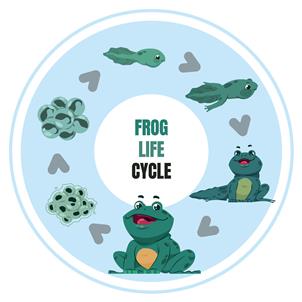 Classroom teachers often find that multilingual learners struggle with science, but Judie Haynes has found that MLs can be successful with the following supports and lesson modifications.
Classroom teachers often find that multilingual learners struggle with science, but Judie Haynes has found that MLs can be successful with the following supports and lesson modifications.
- Limit the vocabulary list to what students actually need to learn. Everyday words and their use should be separated from science words. The vocabulary should be pre-taught, practiced, and displayed on a word wall.
- Create a packet of notes with pictures to make the concepts in a science textbook more comprehensible. It’s difficult for MLs to take their own notes.
- Model all aspects of the science class, from procedures for conducting experiments, pronunciation of science terms, to helping students learn how to find the main ideas in reading, and providing word banks and sentence starters.
- Give students a purpose for their science studies. Sponsor events such as a science fair. Haynes’ students in grades K-3 did group projects while those in grades 4-6 had individual experiments using the scientific method. MLLs got to talk about their projects with their classmates during the fair, providing rich and authentic interaction and communication. They also showed their work to their families, who all turned out the night of the fair.
Judie Haynes was president of NJTESOL/NJBE 2010-2012. She taught elementary ESL for 28 years and is the author and coauthor of eight books for teachers of MLs. She writes monthly blogs for the TESOL International Association.
All teachers need to teach language and literacy, not just English teachers.
By Sue Ollerhead
 Ollerhead presents a strong argument that vocabulary development for MLs is not only the purview of English teachers, but is also essential in math and science classes.
Ollerhead presents a strong argument that vocabulary development for MLs is not only the purview of English teachers, but is also essential in math and science classes.
She observes that research supports teaching language skills in the context of all subjects because of the differences in how the language is used in subjects such as science and math. They also maintain that “We can’t expect English teachers to anticipate these science-specific language challenges.”
The article contains many useful links to other informative documents. One of these is a downloadable guide of the specific difficulties presented in math vocabulary. The guide lists words that have different meanings and use in math as opposed to everyday language, homonyms that have different spellings and are completely different words, sentence structure with dense noun phrases, and sentences in word problems that need to be parsed to be fully understood. It also provides examples of each type of issue and describes how a teacher could present comprehensible lessons for their students.
May 30, 2023
Our Spring Conference

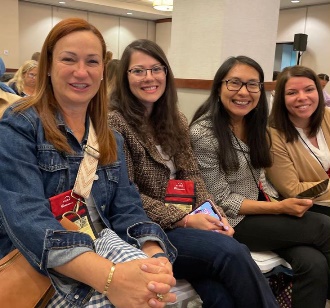 The conference this year was truly a collaborative event as each participant contributed to its success! The Spring Conference team met monthly throughout the year before the conference. Putting together our conference is truly a collaborative effort with overlapping and contributing roles.
The conference this year was truly a collaborative event as each participant contributed to its success! The Spring Conference team met monthly throughout the year before the conference. Putting together our conference is truly a collaborative effort with overlapping and contributing roles.
Here are only a few of the tasks that each member contributed. The Conference Coordinator, Caia Schlessinger, oversaw numerous details of the hotel, speakers, and AV. Our Business Administrator, Gwen Franks, took care of registration, including all of the school purchase orders, and worked with the Technology Coordinator, Marilyn Pongracz, to set up and monitor the conference app. The past president, Maggie Churchill, oversaw the scholarships for the very moving President’s Awards Ceremony. The President, Michelle Land, guided each step of preparation, hosted our scholarship dinner, and announced speakers. LeighAnn Matthews, the Vice-President, was the right hand of the Conference Coordinator and did double duty as a presenter. The Executive Director, Kathy Fernandez, was ever-present during the preparation, introduced and accompanied speakers, and presented workshops. Tina Kern recruited, coordinated, and planned the space for all of the sponsors and exhibitors, including obtaining donated bags, badges, and items for our daily raffle!
Thank you to all of our presenters who contributed their time and expertise to share their experiences and ideas. Finally, we applaud everyone who attended and participated with contagious enthusiasm networking both in-person and on the app. Those pictures were wonderful and it was exciting to see all the meet-ups happening.
If you were not able to attend this year, we hope that you can join us next year, May 29-31 at the Hyatt, New Brunswick. Registration will open in September. We can not do it without you, the members of NJTESOL/NJBE. Please think about presenting next year and inviting colleagues from mainstream content teachers to administrators to join you and learn about our Multilingual learners! Our teaching and organization is a supportive partnership by Strengthening Collaboration!
Some Participants’ Comments
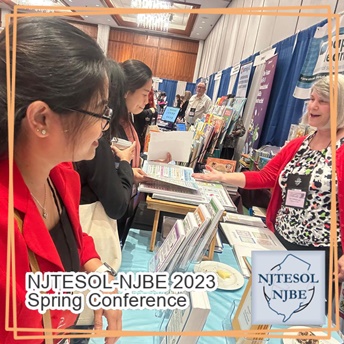 Thank you for all the planning, support and love you all put into this conference. You truly showed us what great collaboration looks like.
Thank you for all the planning, support and love you all put into this conference. You truly showed us what great collaboration looks like.- Thank you for a well organized, inspiring and informative event.
- Thank you. I am enjoying today’s presentations!
- Thank you for an incredible conference! This year, I was also able to see it through two first-timers to our conference. They said they have never been to a conference with such positive energy, passion, emotion and advocacy. One mentioned how happy even the vendors were.
- This has been great! Thank you for all the hard work putting it together!!
- I love attending this conference! It’s a great opportunity to learn and network!
- I enjoyed the NJTESOL workshops, and it was a great learning experience.
- This is really helpful. I use a lot of the strategies mentioned, but still got some new ones.
- It was my first time and I was very impressed! It was a professional environment full of resources and great and nice people eager to share their ideas and expertise. Thank you so much and I can’t wait for next year’s conference. I will be there!
June 6, 2023
Summer Activities for English Language Learners
 The authors of this blog from Continental Press list a variety of ideas to help students continue to learn in the summer.
The authors of this blog from Continental Press list a variety of ideas to help students continue to learn in the summer.
The first suggestion is a letter to themselves about their progress and advice for the fall. The teacher could save these to share with the students when they return to school.
To involve parents, they propose using online translators to assist with communication. They recommend writing a newsletter for each month of the summer break and sending them home with the students. They can include ideas and resources that are accessible to parents to encourage continued learning through the break. The newsletter can also include a list of free programs, events, and activities.
For the students themselves, the authors recommend starting a journal in school that they can add to in the summer. These can include writing prompts, vocabulary, and sentence frames. They also offer a list of online sites so students can continue to practice English. Another suggestion is a list of books to read. The article includes a list of educational podcasts to recommend, one of which is from National Geographic.
Finally, to motivate students, they suggest a bingo-type checklist to bring back in the fall, and a small incentive for what they have finished.
You can get the links to the free newsletter templates and lists of activities and podcasts in the article.
7 Benefits of Reading Aloud to
Multilingual Learners in School
By Judie Haynes
 Haynes’ experience and research has shown that reading out loud to multilingual learners (MLLs) provides numerous academic benefits. Ideally, both teachers and parents should engage in this activity. Here are 7 benefits of reading aloud to Multilingual Learners in a school setting.
Haynes’ experience and research has shown that reading out loud to multilingual learners (MLLs) provides numerous academic benefits. Ideally, both teachers and parents should engage in this activity. Here are 7 benefits of reading aloud to Multilingual Learners in a school setting.
- Sustain Cognitive Development – Reading aloud provides background information which increases MLLs understanding of the world around them.
- Improve Working Memory – It helps children pay attention and use their memory, which leads to increasing their reading level.
- Increase Vocabulary Development – Reading aloud increases word recognition when key vocabulary is pre taught.
- Model Reading Fluency, Automaticity, and Expression – It gives MLLs the chance to hear the rhythm and intonation of English. They can practice this through choral reading and other strategies.
- Foster a Love of Reading for Pleasure – Students can be inspired to read in their home language as well as English.
- Strengthen the Bond Between Teacher and Student – This pleasurable activity helps create a connection between the teacher and students and can foster excitement for independent reading.
- Enhance Imagination and Creativity – Reading aloud exposes MLLs to a wide variety of prospects which can enhance creative thinking.
Judie Haynes was president of NJTESOL/NJBE 2010-2012. She taught elementary ESL for 28 years and is the author and coauthor of eight books for teachers of MLs. She writes monthly blogs for the TESOL International Association.
June 13, 2023
NJ Cover All Kids Healthcare Program
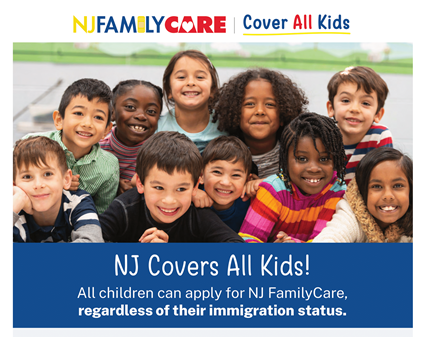 Cover All Kids is a healthcare program that all Bilingual and ESL Pre-K through 12th-grade teachers and Adult ESL Instructors should know about. Please share this information widely with school health professionals, educators, and parents.
Cover All Kids is a healthcare program that all Bilingual and ESL Pre-K through 12th-grade teachers and Adult ESL Instructors should know about. Please share this information widely with school health professionals, educators, and parents.
Cover All Kids is an initiative to reach all uninsured children in New Jersey under the age of 19. It provides NJ Family Care coverage to all income-eligible kids in New Jersey. As of January 2023, New Jersey has expanded coverage to all income-eligible children, regardless of immigration status. They are focusing on registering children without “qualified immigrant” status.
Parents, relatives, or caregivers can apply online at https://njfamilycare.dhs.state.nj.us/. They can also apply over the phone by speaking to an NJ FamilyCare health benefits coordinator at 1-800-701-0710 (TTY: 711). The person submitting the application has to be an adult (18+ years old). If an emancipated minor is submitting their own application, they must have proof of legal emancipation.
The person filling out the application does not have to apply for coverage for themselves. They will not have to share their citizenship or immigration status. Note: if the applicant does not speak English, there are live translators available who can help complete an application. Call 1-800-701-0710 (TTY: 711) and ask for a live translation into the primary language.
Members will have to renew their coverage once a year. This is the same as standard NJ FamilyCare members. It is important for families to keep their addresses updated with NJ FamilyCare because important messages and notices come through the mail.
Most members will not have to pay anything to receive services. Some members who have higher incomes will have co-pays between $5 and $35, as of 2022. A co-pay is what you pay at the doctor’s office for the visit. Click here for more information.
NJ Family Care Coverage
With NJ Family Care, income-eligible children under 19 can receive:
- Primary and specialty care, including check-ups and other visits
- Eye Glasses
- Hospitalization (both inpatient and outpatient)
- Lab tests/x-rays
- Prescriptions
- Dental Services
- Preventive Screenings
- Vaccinations
- Mental Health Care
- Substance Use Testing and Treatment
- Vision Services
- Hearing Services
- Lead Screening
- Family Planning
- Other medically necessary services
You can access the flyers here:
English – All Information
Spanish – Announcement
Arabic – Announcement


June 20 2023
Welcome NJTESOL/NJBE
New Executive Board Members
 We would like to welcome our new Executive Board members.
We would like to welcome our new Executive Board members.
- Jenna Maneri, Elementary ESL 1-5 Representative
- Mary Mansfield, NJEA Rep at Large
- Kathryn Tepedino, ESL Secondary Representative
- Aphrodite Dellaporte, Special Education Representative
- Nurka Nieves, Parent Community Action Representative
- Monica Artuga, Liaison
You can reach out to your Special Interest Group representatives to present your concerns at the monthly Executive board meetings. They answer questions on the hotlist, find presenters and give workshops at chapter meetings and the Spring Conference. They also help run the conference. Besides this, they solicit and review scholarship/award applications. In addition, they are involved in other professional associations related to their SIG area.
See our website for a complete list of Executive Board members.
Our Outgoing Executive Board Members
Thank You
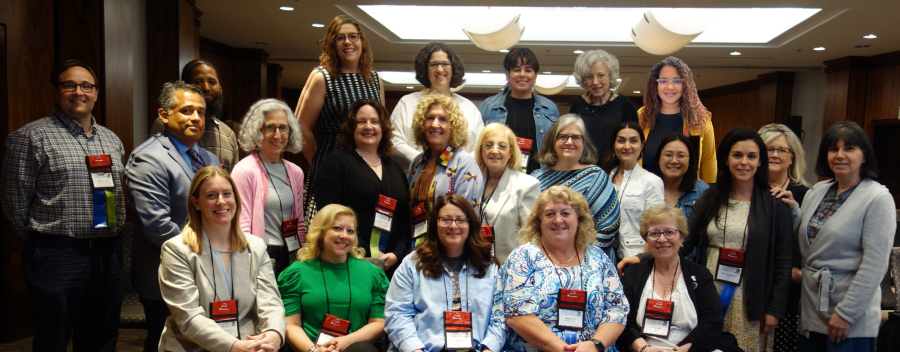 New and Outgoing Executive Board Members
New and Outgoing Executive Board Members
We would also like to thank our outgoing Executive Board members. Some served this past year while others have been active for several years. We especially would like to recognize our historian, Barbara Tedesco. She was appointed to the board as membership chair in 1979, was president from 1991 to 1993, and has been our guide since then.
- Alamelu Sundaram-Walters, Rep at Large
- Jessica Perdomo-O’Hara, Bilingual/ESL Early Childhood/Pre-K
- Soyoun Ouh, ESL Secondary Representative
- Andrew Sansone, Adult Education Representative
- Adela Joyce, Special Education Representative
- Lisa Lane, Social Media Coordinator
- Erika Gambuti, Parent/Community SIG Representative
- Pedro Trivella, Elementary ESL SIG Rep
- Abdul Qawwee Shabazz, Elementary ESL SIG Rep
- Barbara Tedesco, Historian
- Hana Prashker, Liaison
Michelle Land
President, NJTESOL/NJBE 2022-2024
Announcements
2023 Scholarships and Awards have been extended until March 22 for the Bilingual Educator and Jessee Reppy Awards.
Nominations for the NJTESOL-NJBE Executive Board have been extended through March 22nd. You can nominate yourself!
2023 NJTESOL/NJBE SPRING CONFERENCE
Registration is available through May 1, 2023 or when each day’s capacity is reached.
See the preliminary schedule on our website.
You can choose to attend
In-Person at the Hyatt Regency Hotel, May 23, 24 & 25 (Tuesday, Wednesday & Thursday)
OR Virtual Library, Access starting on May 26 through September 1
Mercer Chapter Meeting, March 30, 2023 at 6:00 PM online
We’re hosting a new event with Dr. Ken Bond, and we hope you’re able to join us!
Register now to reserve your spot!
Bergen County Chapter Meeting: Online, April 19, 2023, 4:30-5:30 PM
Topic: Immigrant Youth in NJ: A Dive into Immigration Law for K-12 Educators and Staff
Join us for a presentation given by Erin Sweeney, an immigration attorney at Kids in Need of Defense (KIND), a national nonprofit and legal services organization that serves unaccompanied children in their immigration proceedings. This session specifically targets K-12 faculty and staff in New Jersey. Ms. Sweeney will share the importance of education from an immigration legal standpoint as well as highlight recent laws and policies in New Jersey that can help all K-12 teachers to support and to advocate for their students.
Burlington ESL Consortium – Virtual Meeting, May 4th, 4:00. Our speaker will be a representative from NJ Consortium for Immigrant Children. The presenter will discuss ways that NJCIC works to provide for immigrant students’ needs and support their families. They will also explain how to make a referral for a student to NJCIC.
Nominate the member of the month!
NJTESOL/NJBE has so many amazing teachers throughout our state that it would be fitting to highlight some of them. Nominees could be colleagues who are available to answer questions about ELLs or the Bilingual Education code; educators who support students and their families beyond the classroom with projects, college applications, and extracurricular activities; someone who joins committees in support of ELLS or to implement positive change for the community. The nominee must be a member of NJTESOL/NJBE.
The Title III/ESL/Bilingual Unit will be hosting Office Hours on May 2, 2023 from 8:30 am to 9:30 am. The topic is Parents/Guardians who refuse ELL services. This Office Hour will include school district representatives who will share their experiences and respond to questions on this topic. You do not have to register to attend. Please include the title Office Hours in the subject line. Please use the TEAMS link below to attend the Office Hour.
We will be at the Spring Conference next week, May 23-25, so Weekly Voices will be sent again on May 30th.
Somerset/Hunterdon County Chapter – LAST MEETING, Thursday, June 8th at 4:30 PM via Zoom. We will be discussing and reflecting on successful lessons and activities that target speaking, listening, reading and writing practice. Please RSVP using this link on Eventbrite. We hope to see you there!
Summer Book Study
Join the Countering Anti-Black Racism Committee and Dr. Ashanti Holley, BCIT’s assistant superintendent for equity and diversity, for a summer book study on cultivating racial literacy. We will be discussing Tell Me Who You Are by Winona Guo and Priya Vulchi
Dates will be June 19, July 10, July 31, and August 21 at 7:00. A final discussion with Dr. Holley will take place in October. To register complete this form.
The New Jersey Department of Human Services supports “Cover All Kids,” an expansion of NJ FamilyCare to all of New Jersey’s children, regardless of their immigration status. NJ FamilyCare provides a variety of health services, such as doctor/specialist visits, mental health, vision, dental, vaccinations, and a number of other benefits to keep children healthy. To find out more about Cover All Kids and for flyers and social media graphics, click here.
NJ FamilyCare has returned to regular annual renewals. From April 1, 2023 to March 31, 2024, NJ FamilyCare will mail the first renewal packets since 2020 to its members. Please make sure your mailing address is up-to-date with NJ FamilyCare by calling 1-800-701-0710 (TTY: 711). If you have questions, visit https://nj.gov/humanservices/dmahs/staycoverednj/ , or call 1-800-701-0710 (TTY: 711).

